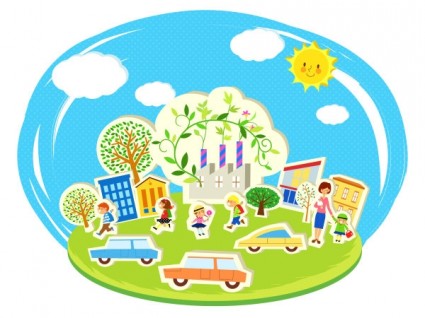
The city where we live

Opening prayer
First: begin the class with the following questions:
* What’s the name of your city?
* What’s the name of your state?
* How is your country called?
* How is your planet called?
* What do we have of great importance in our town? Hospitals, schools, public squares, houses, streets, trees, flowers, rivers, animals, religious temples.
* Do you use the services and open spaces available in your town? How? ? Schools - study - squares - wander/play - hospitals - to treat diseases - house – to live - streets –trees/flowers/rivers - oxygen , bring beauty and fragrance, life - animals - friends, fellow travellers , help to release us from our anxieties, stress, sadness - religious temples - help in our spiritual evolution.
Second: tell them the story “Respect to others’ things”.
Third: talk about the story.
* What did Paul do with public property? Paul and his "friends" spoiled public property. They broke the public phone as a joke and ruined the tires of the ambulance for fun, among other things.
* Was Paul’s attitude correct? No.
* And what happened to Paul’s family when they needed to use them? They were damaged and this was the reason why his father had trouble being treated at the hospital when needed.
* What Paul decided to do? He decided to repair his mistakes and promised himself he will never destroy public property ever again.
Fourth: talk about the subject of the lesson.
* What can we do to keep our town clean and well preserved?
Collaborate with maintenance of hygiene in public roads by not throwing trash on sidewalks and culverts; preserving street signposts; not spoiling the paintings of houses, of public places, of schools or religious temples.
* It's also a sign of respect to preserve the city parks and gardens, public places of entertainment and leisure, since they were created to improve the lives of its inhabitants.
* By not breaking the trees and flowers in the streets, not kicking the bins, not spoiling public transport and by taking care in cleaning our home.
* To collaborate in maintaining the cleanliness and organization of our city is the obligation of all citizens and especially of those who participate in the Spiritist Education classes.
* Is the Spiritist centre part of our city? Yes. It is public property? Yeah, what can everyone do to preserve it? Do not scratch the walls and tables; throwing trash in the trash bin and the toilet paper in the wastebasket. Leave the faucets always closed after use, turn off the lights when leaving the room, sitting properly in chairs, etc. The Spiritist centre is a place frequented by many people, so everyone must work together doing their duty.
* Remember that our thoughts also help to clean or make the city where we live dirty. Good and bad thoughts are in the environment where we live.
Fifth: suggested activities.
1 - Bring a box with questions about the theme of the lesson and a stereo, preferably with songs that are sang by the children in the Spiritist education classes. Pass the box around and leave a song playing. When the music is stopped by the Spiritist education, the child who has the box in his/her hands will need to draw a question from it and answer. If he/she doesn’t know the answer the child can ask for help from colleagues.
Suggested questions:
1. How is the city where you live?
2. What are the beautiful and less beautiful things that can be found in your city?
3. What can we do to keep the city clean?
4. Who is responsible for keeping the city clean?
5. Do you know what graffiti is? Is it correct to be done?
6. Should we keep the street signs in the right place?
7. How should public gardens be kept?
8. What should we do with the waste?
9. Who should take care of the sidewalks that are in front of your house?
10. Why should we take care of our city?
11. When you walk in the street and eat a candy, what do you do with its wrapping paper?
12. What do you think of people damaging public transport?
13. How can we help conserve the Spiritist Centre we participate in?
14. How should we use public toilets?
2 - Bring a poster with stickers representing your city in them.
Reinforce that we are all responsible for looking after the town where we live.
Redo the question that was asked at the beginning of this class: What do we have of great importance in our town? Draw what represents what they respond to this question, wondering how they use these resources. It was a great activity that attracted the participation of all children.
Click here to find our panel.
3 - Click here for suggested drawing to be painted by the children.
Final prayer
Class suggested being suitable for: 1st cycle (7 to 8 years old).
Translation: Carolina von Scharten, London, Sir William Crookes Spiritist Society linked to BUSS - The British Union of Spiritist Societies.

